2020年中考英语动词辨析大全(附答案)
- 格式:doc
- 大小:71.00 KB
- 文档页数:13
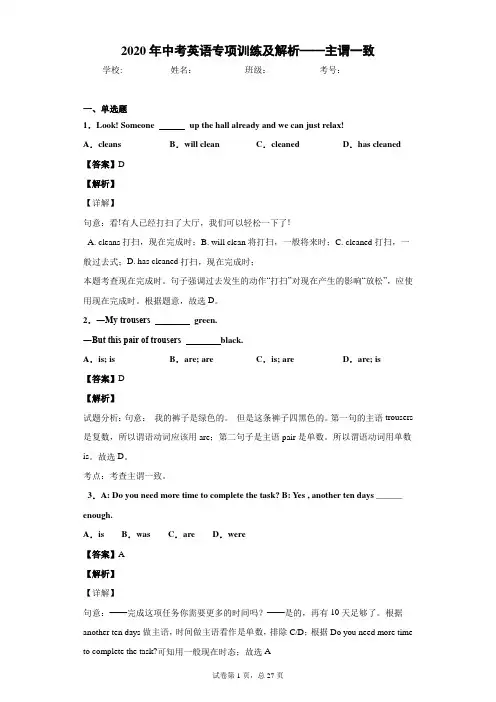
2020年中考英语专项训练及解析——主谓一致学校:___________姓名:___________班级:___________考号:___________一、单选题1.Look! Someone up the hall already and we can just relax!A.cleans B.will clean C.cleaned D.has cleaned 【答案】D【解析】【详解】句意:看!有人已经打扫了大厅,我们可以轻松一下了!A. cleans打扫,现在完成时;B. will clean将打扫,一般将来时;C. cleaned打扫,一般过去式;D. has cleaned打扫,现在完成时;本题考查现在完成时。
句子强调过去发生的动作“打扫”对现在产生的影响“放松”,应使用现在完成时。
根据题意,故选D。
2.―My trousers green.―But this pair of trousers black.A.is; is B.are; are C.is; are D.are; is【答案】D【解析】试题分析:句意:--我的裤子是绿色的。
--但是这条裤子四黑色的。
第一句的主语trousers 是复数,所以谓语动词应该用are;第二句子是主语pair是单数。
所以谓语动词用单数is。
故选D。
考点:考查主谓一致。
3.A: Do you need more time to complete the task? B: Yes , another ten days ______ enough.A.is B.was C.are D.were【答案】A【解析】【详解】句意:——完成这项任务你需要更多的时间吗?——是的,再有10天足够了。
根据another ten days做主语,时间做主语看作是单数,排除C/D;根据Do you need more time to complete the task?可知用一般现在时态;故选A4.________the teachers in their school is about 200 and one fourth of them are_____teachers.A.The number of, woman B.The number of , women C.A number of, woman 【答案】B【解析】【详解】句意“在他们学校老师的数量大约是200,且当中的四分之一是女老师”。
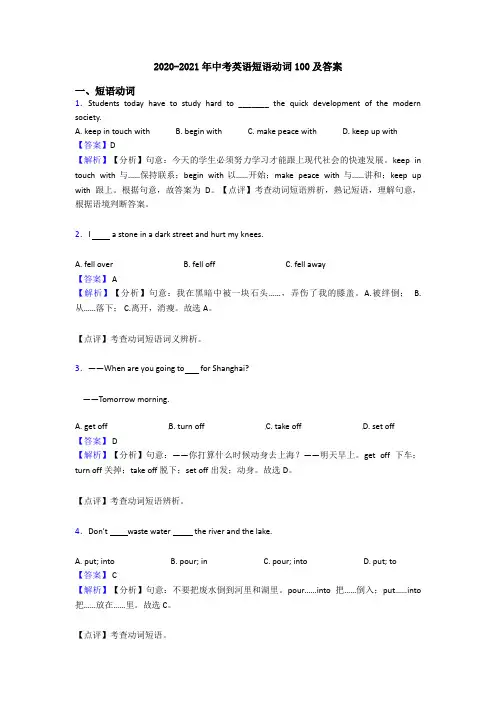
2020-2021年中考英语短语动词100及答案一、短语动词1.Students today have to study hard to _______ the quick development of the modern society.A. keep in touch withB. begin withC. make peace withD. keep up with【答案】D【解析】【分析】句意:今天的学生必须努力学习才能跟上现代社会的快速发展。
keep in touch with与……保持联系;begin with以……开始;make peace with与……讲和;keep up with跟上。
根据句意,故答案为D。
【点评】考查动词短语辨析,熟记短语,理解句意,根据语境判断答案。
2.I a stone in a dark street and hurt my knees.A. fell overB. fell offC. fell away【答案】 A【解析】【分析】句意:我在黑暗中被一块石头……,弄伤了我的膝盖。
A.被绊倒; B.从……落下; C.离开,消瘦。
故选A。
【点评】考查动词短语词义辨析。
3.——When are you going to for Shanghai?——Tomorrow morning.A. get offB. turn offC. take offD. set off【答案】 D【解析】【分析】句意:——你打算什么时候动身去上海?——明天早上。
get off下车;turn off关掉;take off脱下;set off出发;动身。
故选D。
【点评】考查动词短语辨析。
4.Don't waste water the river and the lake.A. put; intoB. pour; inC. pour; intoD. put; to【答案】 C【解析】【分析】句意:不要把废水倒到河里和湖里。
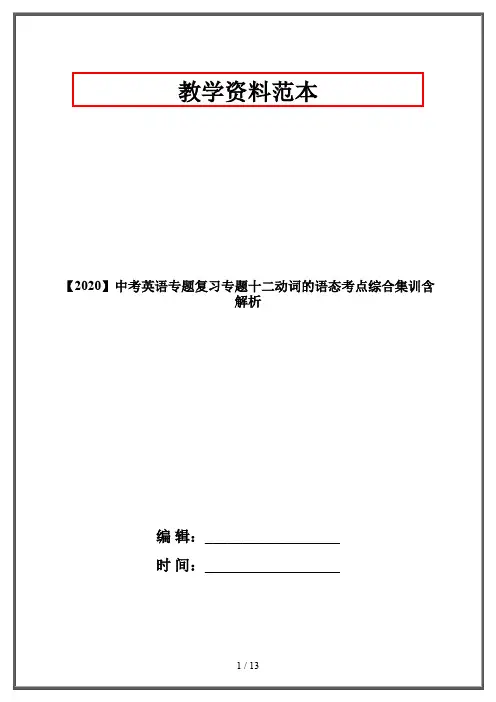
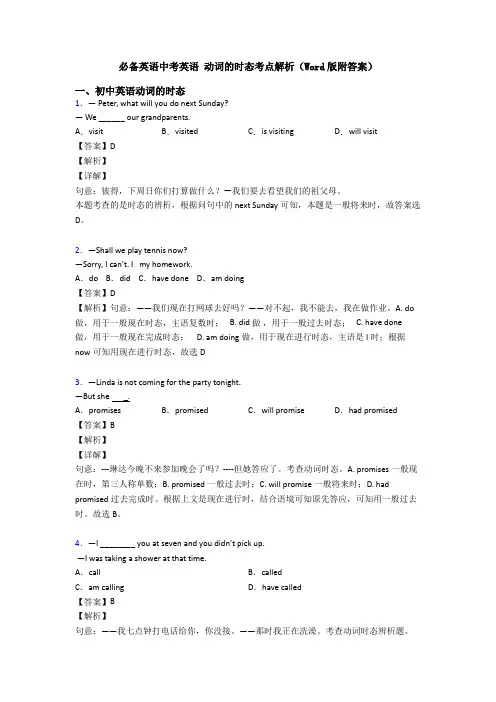
必备英语中考英语动词的时态考点解析(Word版附答案)一、初中英语动词的时态1.— Peter, what will you do next Sunday?— We ______ our grandparents.A.visit B.visited C.is visiting D.will visit【答案】D【解析】【详解】句意:彼得,下周日你们打算做什么?—我们要去看望我们的祖父母。
本题考查的是时态的辨析,根据问句中的next Sunday可知,本题是一般将来时,故答案选D。
2.—Shall we play tennis now?—Sorry, I can’t. I my homework.A.do B.did C.have done D.am doing【答案】D【解析】句意:——我们现在打网球去好吗?——对不起,我不能去,我在做作业。
A. do 做,用于一般现在时态,主语复数时; B. did做,用于一般过去时态; C. have done 做,用于一般现在完成时态; D. am doing做,用于现在进行时态,主语是I时;根据now可知用现在进行时态,故选D3.—Linda is not coming for the party tonight.—But she _.A.promises B.promised C.will promise D.had promised【答案】B【解析】【详解】句意:---琳达今晚不来参加晚会了吗?----但她答应了。
考查动词时态。
A. promises一般现在时,第三人称单数;B. promised一般过去时;C. will promise一般将来时;D. had promised过去完成时。
根据上文是现在进行时,结合语境可知原先答应,可知用一般过去时。
故选B。
4.—I ________ you at seven and you didn’t pick up.—I was taking a shower at that time.A.call B.calledC.am calling D.have called【答案】B【解析】句意:——我七点钟打电话给你,你没接。
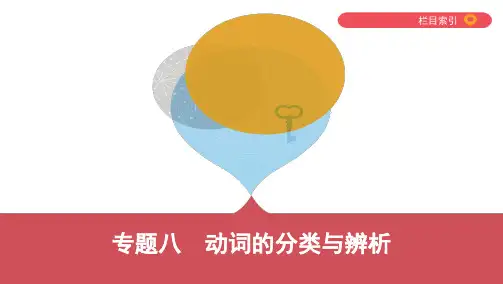
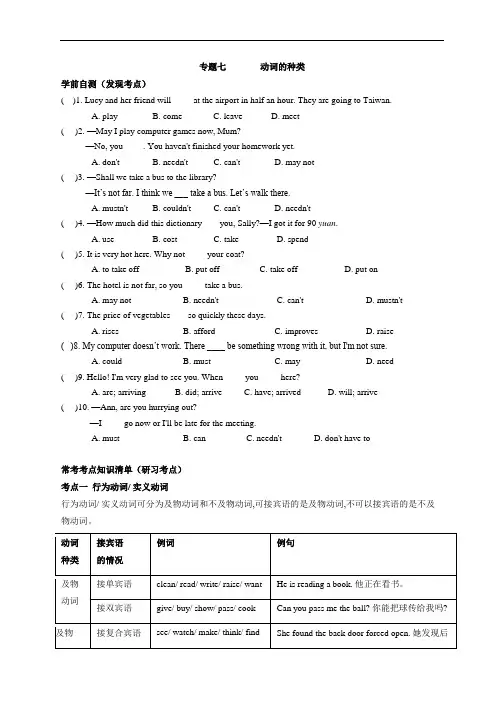
专题七动词的种类学前自测(发现考点)( )1. Lucy and her friend will ____ at the airport in half an hour. They are going to Taiwan.A. playB. comeC. leaveD. meet( )2. —May I play computer games now, Mum?—No, you ____. You haven't finished your homework yet.A. don'tB. needn'tC. can'tD. may not( )3. —Shall we take a bus to the library?—It’s not far. I think we ___ take a bus. Let’s walk there.A. mustn'tB. couldn'tC. can'tD. needn't( )4. —How much did this dictionary ___ you, Sally?—I got it for 90 yuan.A. useB. costC. takeD. spend( )5. It is very hot here. Why not ____ your coat?A. to take offB. put offC. take offD. put on( )6. The hotel is not far, so you ____ take a bus.A. may notB. needn'tC. can'tD. mustn't( )7. The price of vegetables ___ so quickly these days.A. risesB. affordC. improvesD. raise( )8. My computer doesn’t work. There ____ be something wrong with it, but I'm not sure.A. couldB. mustC. mayD. need( )9. Hello! I'm very glad to see you. When ____ you ____ here?A. are; arrivingB. did; arriveC. have; arrivedD. will; arrive( )10. —Ann, are you hurrying out?—I ____ go now or I'll be late for the meeting.A. mustB. canC. needn'tD. don't have to常考考点知识清单(研习考点)考点一行为动词/ 实义动词行为动词/ 实义动词可分为及物动词和不及物动词,可接宾语的是及物动词,不可以接宾语的是不及物动词。
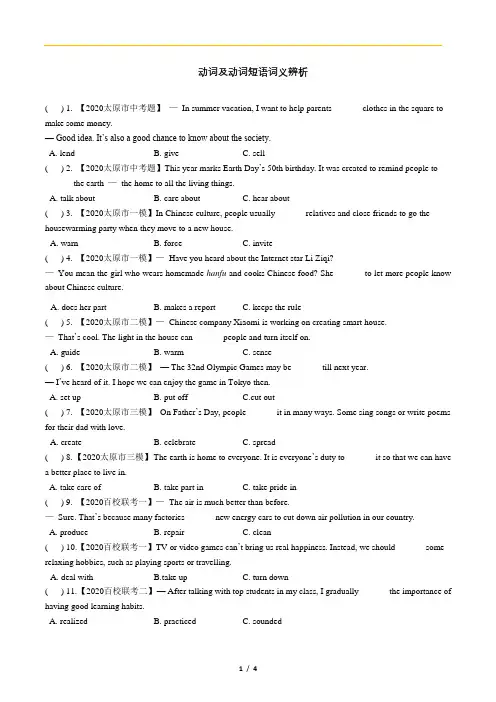
动词及动词短语词义辨析( ) 1. 【2020太原市中考题】—In summer vacation, I want to help parents ______ clothes in the square to make some money.—Good idea. It’s also a good chance to know about the society.A. lendB. giveC. sell( ) 2. 【2020太原市中考题】This year marks Earth Day’s 50th birthday. It was created to remind people to______ the earth —the home to all the living things.A. talk aboutB. care aboutC. hear about( ) 3. 【2020太原市一模】In Chinese culture, people usually ______ relatives and close friends to go the housewarming party when they move to a new house.A. warnB. forceC. invite( ) 4. 【2020太原市一模】—Have you heard about the Internet star Li Ziqi?—You mean the girl who wears homemade hanfu and cooks Chinese food? She ______ to let more people know about Chinese culture.A. does her partB. makes a reportC. keeps the rule( ) 5. 【2020太原市二模】—Chinese company Xiaomi is working on creating smart house.—That’s cool. The light in the house can ______ people and turn itself on.A. guideB. warmC. sense( ) 6. 【2020太原市二模】— The 32nd Olympic Games may be ______ till next year.— I’ve heard of it. I hope we can enjoy the game in Tokyo then.A. set upB. put offC.cut out( ) 7. 【2020太原市三模】On Father’s Day, people ______ it in many ways. Some sing songs or write poems for their dad with love.A. createB. celebrateC. spread( ) 8. 【2020太原市三模】The earth is home to everyone. It is everyone’s duty to ______ it so that we can have a better place to live in.A. take care ofB. take part inC. take pride in( ) 9. 【2020百校联考一】—The air is much better than before.—Sure. That’s because many factories ______ new energy cars to cut down air pollution in our country.A. produceB. repairC. clean( ) 10.【2020百校联考一】TV or video games can’t bring us real happiness. Instead, we should ______ some relaxing hobbies, such as playing sports or travelling.A. deal withB.take upC. turn down( ) 11. 【2020百校联考二】— After talking with top students in my class, I gradually ______ the importance of having good learning habits.A. realizedB. practicedC. sounded( ) 12. 【2020百校联考二】Many people don’t know the importance of health until they are ill. So we should learn to ______ ourselves and have a good living habit in daily life.A. agree withB. cheer upC. look after( ) 13. 【2020百校联考三】President Xi Jinping came to Shanxi in May, 2020 and he ______ the people to fight the difficulties and seize the time.A. invitedB. encouragedC. expressed( ) 14. 【2020 百校三】Huang Xuhua and Zeng Qingcun won the Highest Science and Technology Prizein 2019. They are the real national heroes who we should ______.A. look up toB. look forward toC. look back at( ) 15. 【2020 百校三】During the past few years, China has made great achievements in many fields. All the Chinese ______ our amazing China.A. show interest inB. take care ofC. take pride in( ) 16. 【2020 百校四】Take a close look at successful people around us, then you may ______ they have something in common — hard-working and confident.A. discoverB. guessC. forget( ) 17. 【2020 百校四】My little sister has fallen in love with the story of Snow White and the Seven Dwarfs recently. She dreams of being a princess and always wants to ______ as a princess.A. bring upB. show upC. dress up( ) 18. 【2020 考前适应性训练】Some events only happen once in our lives, so we must ______ them.A. receiveB. valueC. search( ) 19. 【2020 考前适应性训练】Remember to use what you’re studying because learning ______ only when you can use what you know.A. has problemsB. takes placeC. makes mistakes( ) 20. 【2020 江苏南京】China’s efforts to stop the spread of COVID-19 will ______ the world’s abilityto limit the harm in the near future.A. imagineB. inventC. insistD. improve( ) 21. 【2020 福建】On video, Doctor Zhong Nanshan ______ teenagers to study hard in the first lesson of this term.A. allowedB. trainedC. encouraged( ) 22. 【2020 江苏南京】— Which bicycle should I choose, sir?— It ______ what you want to use it for.A. takes onB. carries onC. puts onD. depends on( ) 23. 【2020 四川乐山】Why don’t you ______ smoking? It’s very harmful.— I tried many times, but it’s really hard.A. give upB. ring upC. put up( ) 24. 【2020 四川凉山州】A lot of schools across China ______ starting classes because of COVID-19. A. put up B. put off C. put on D. put away( ) 25. 【2020 四川广元】The song Dream It Possible often reminds me that we should always try our best and never ______ catching our dreams.A. give upB. take upC. put up( ) 26. 【2020 四川甘孜州】We have to______ the sports meeting for the bad weather.A. put onB. put upC. put off( ) 27.【2020天津】Lang Ping is a symbol of courage and success, and we______ her.A. come fromB. stand forC. take pride inD. get ready for( ) 28. 【2020天津】I was busy this morning and didn’t have time to ______ my email.A. wasteB. punishC. believeD. check( ) 29. 【2020安徽】—Hi, Jill. I’d like to share with you the latest news about the height of Qomolangma. —Really? Make sure the news is true before you _______ it.A. receiveB. spreadC. cancelD. hear( ) 30. 【2020安徽】We are supposed to ______ smart phones and take more exercise instead.A. take upB. put awayC. look intoD. give out( ) 31. 【山东青岛】Please remember to ______ the electricity and water before you leave the laboratory.A. take offB. shut offC. go offD. put off( ) 32. 【2020山东滨州】— Tom, it smells so terrible here.— Sorry, mum. I will ______ my socks and wash them right away.A. put offB. take offC. turn offD. cut off( ) 33. 【2020新疆】—I don’t know how to ______ the old clothes.—You can give them away to the charity.A. hand inB. deal withC. take upD. clean up( ) 34. 【2020新疆】Pay no attention to those who laugh at you. What most ______ is how you see yourself. A. drinks B. matters C. cares D. minds( ) 35. 【2020江苏无锡】—We’ve discussed this many times. No jeans to the party.—Very well then, if you ______. But where’s my suit?A. suggestB. imagineC. agreeD. insist( ) 36.【2020江苏淮安】My brother often ______ his spare time to help me with my spoken English.A. puts upB. gives upC. opens upD. tidies up( ) 37. 【2020江苏苏州】— Tony, come over. What do the letters “KIT” mean in the text message? —Don’t you know that, Amy? They ______ “keep in touch”.A. search forB. ask forC. go forD. stand for( ) 38. 【2020江苏连云港】The Chinese language has become a bridge to ______ China ______ the rest of the world.A. connect...toB. translate...toC. compare...withD. separate...from( ) 39.【2020 云南】Don’t ________ our hopes. As long as we pull together, we’ll make it.A. give upB. give outC. give backD. give away( ) 40. 【2020 贵州安顺】Drugs are harmful to people’s physical and mental health. We teenagers must______ them.A. take care ofB. keep away fromC. get used to( ) 41. 【2020贵州铜仁】— Fangfang, shall we go to see a film on Saturday?—Sorry. I’ll have to ______ my younger brother because my mother is out.A. look atB. look forC. look upD. look after( ) 42. 【2020贵州黔东南州】Sam ______ a computer from me yesterday.A. soldB. borrowedC. lentD. returned( ) 43. 【2020辽宁丹东】—How’s it going, Tina?— Great. My company has ______ me a good job.A. offeredB. providedC. introducedD. discovered( ) 44. 【2020辽宁丹东】— You seem tired. Wha t’s wrong?— I ______ to study for my English test last night.A. picked upB. woke upC. cheered upD. stayed up( ) 45. 【2020辽宁丹东】It’s rather cold here. You’d better ______ your coat.A. put awayB. not put onC. not take offD. take off( ) 46. 【2020辽宁锦州】— Bob, you have to finish your school project today.—Don’t worry, mum. I won’t ______ today’s work till tomorrow.A. put offB. take offC. give upD. set up( ) 47. 【2020黑龙江哈尔滨】— Who do you admire most, Yang Ming?— Zhong Nanshan. Not only I but also my classmates ______ him.A. look forward toB. look up toC. are up to( ) 48. 【2020黑龙江龙东】—Kate, don’t forget to ______ the light when you leave the room.— OK, mom.A. cut offB. put offC. turn off( ) 49. 【2020湖北武汉】— What makes you ______ we’re going to sell the house?—I hear you’ve got a job abroad.A. doubtB. wonderC. promiseD. suppose( ) 50. 【2020湖北武汉】— You have plenty of homework, don’t you?— Yeah, it ______ the little time I have outside of school.A. makes upB. takes upC. turns downD. breaks down答案:7. 动词及动词短语词义辨析1-5 CBCAC 6-10 BBAAB 11-15 ACBAC 16-20 ACBBD 21-25 CDABA 26-30 CCDBB 31-35 BBBBD 36-40 BDAAB 41-45 DBADC 46-50 ABCDB。
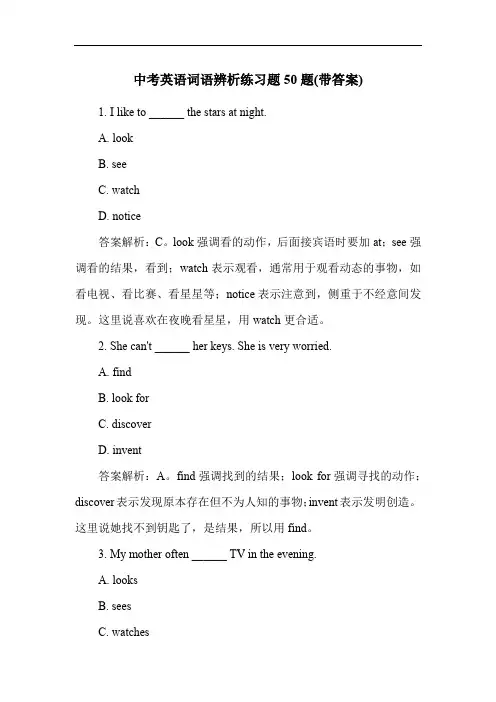
中考英语词语辨析练习题50题(带答案)1. I like to ______ the stars at night.A. lookB. seeC. watchD. notice答案解析:C。
look强调看的动作,后面接宾语时要加at;see强调看的结果,看到;watch表示观看,通常用于观看动态的事物,如看电视、看比赛、看星星等;notice表示注意到,侧重于不经意间发现。
这里说喜欢在夜晚看星星,用watch更合适。
2. She can't ______ her keys. She is very worried.A. findB. look forC. discoverD. invent答案解析:A。
find强调找到的结果;look for强调寻找的动作;discover表示发现原本存在但不为人知的事物;invent表示发明创造。
这里说她找不到钥匙了,是结果,所以用find。
3. My mother often ______ TV in the evening.A. looksB. seesC. watches答案解析:C。
watch TV是固定搭配,表示看电视。
look后面需加at再接宾语;see强调看的结果,通常不用于表示看电视;view更侧重于看待、观察的意思,不用于看电视这个表达。
4. The little boy ______ a strange man in the park yesterday.A. lookedB. sawC. watchedD. stared答案解析:B。
yesterday表明是过去的事情,这里强调看到了一个奇怪的男人这个结果,所以用saw。
look强调动作;watch侧重于观看动态事物;stare表示凝视,通常带有不礼貌的意味,在这里不符合语境。
5. I ______ around but found nothing.A. lookedB. sawC. watchedD. noticed答案解析:A。
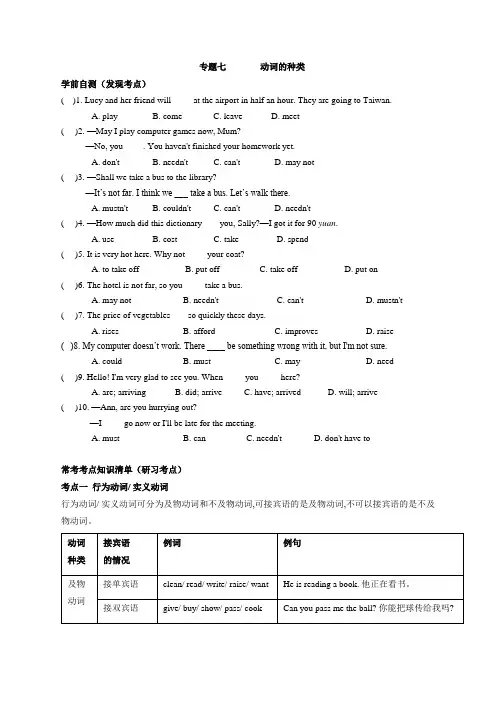
专题七动词的种类学前自测(发现考点)( )1. Lucy and her friend will ____ at the airport in half an hour. They are going to Taiwan.A. playB. comeC. leaveD. meet( )2. —May I play computer games now, Mum?—No, you ____. You haven't finished your homework yet.A. don'tB. needn'tC. can'tD. may not( )3. —Shall we take a bus to the library?—It’s not far. I think we ___ take a bus. Let’s walk there.A. mustn'tB. couldn'tC. can'tD. needn't( )4. —How much did this dictionary ___ you, Sally?—I got it for 90 yuan.A. useB. costC. takeD. spend( )5. It is very hot here. Why not ____ your coat?A. to take offB. put offC. take offD. put on( )6. The hotel is not far, so you ____ take a bus.A. may notB. needn'tC. can'tD. mustn't( )7. The price of vegetables ___ so quickly these days.A. risesB. affordC. improvesD. raise( )8. My computer doesn’t work. There ____ be something wrong with it, but I'm not sure.A. couldB. mustC. mayD. need( )9. Hello! I'm very glad to see you. When ____ you ____ here?A. are; arrivingB. did; arriveC. have; arrivedD. will; arrive( )10. —Ann, are you hurrying out?—I ____ go now or I'll be late for the meeting.A. mustB. canC. needn'tD. don't have to常考考点知识清单(研习考点)考点一行为动词/ 实义动词行为动词/ 实义动词可分为及物动词和不及物动词,可接宾语的是及物动词,不可以接宾语的是不及物动词。
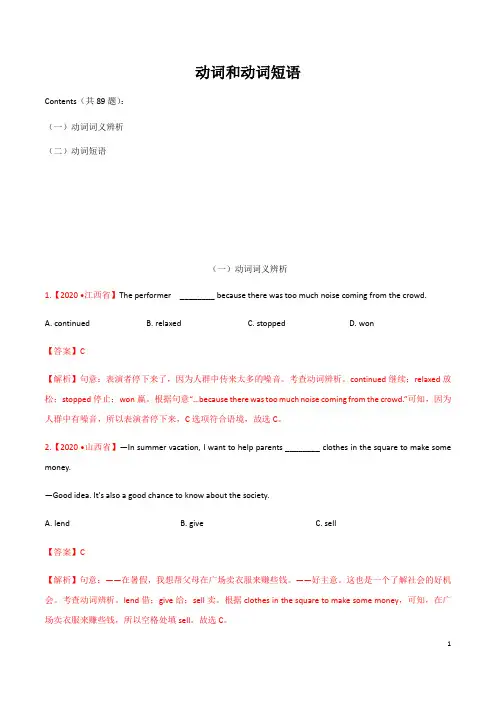
动词和动词短语Contents(共89题):(一)动词词义辨析(二)动词短语(一)动词词义辨析1.【2020 •江西省】The performer ________ because there was too much noise coming from the crowd.A. continuedB. relaxedC. stoppedD. won【答案】C【解析】句意:表演者停下来了,因为人群中传来太多的噪音。
考查动词辨析。
continued继续;relaxed放松;stopped停止;won赢。
根据句意“…because there was too much noise coming from the crowd.”可知,因为人群中有噪音,所以表演者停下来,C选项符合语境,故选C。
2.【2020 •山西省】—In summer vacation, I want to help parents ________ clothes in the square to make some money.—Good idea. It's also a good chance to know about the society.A. lendB. giveC. sell【答案】C【解析】句意:——在暑假,我想帮父母在广场卖衣服来赚些钱。
——好主意。
这也是一个了解社会的好机会。
考查动词辨析。
lend借;give给;sell卖。
根据clothes in the square to make some money,可知,在广场卖衣服来赚些钱,所以空格处填sell。
故选C。
3.【2020 •安徽省】— Hi, Jill. I'd like to share with you the latest news about the height of Qomolangma.—Really? Make sure the news is true before you it.A.receive B.spread C.cancel D.hear【答案】B【解析】句意:——嗨,吉尔。
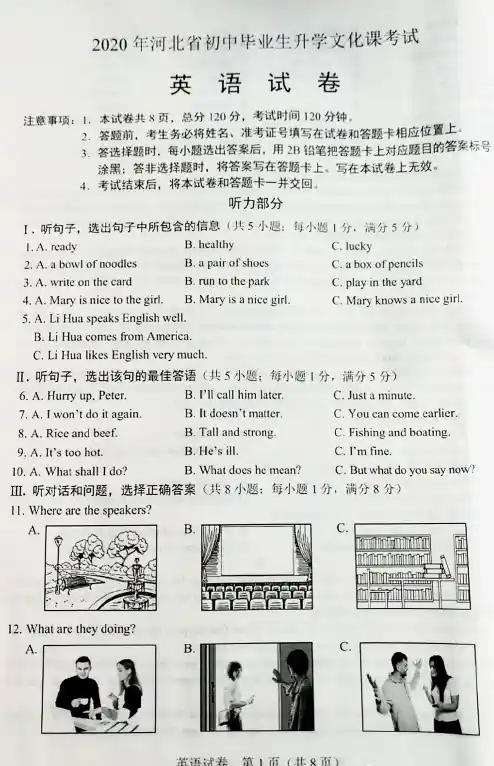
笔试部分VI.单项选择。
答案:ABCAB DCBDC31.考查地点介词。
根据the station车站,是小地点,可知用介词at。
句意:你什么时候到,我将去火车站接你。
故选:A。
32.考查物主代词。
根据句意,可知这里第二人称你的,your。
句意:Nancy,胡萝卜对你的眼睛有益,请多吃点吧。
故选:B。
33.考查动词时态。
根据情景,此处用现在进行时表示动态的变化。
句意:天正在变黑,我可以打开灯吗?故选:C。
34.考查情态动词。
根据句意,可知用can,表示能。
句意:你能闻到一些烧焦的味道吗,(我们)去看看发生了什么?故选:A。
35.考查名词词义辨析。
A.book书;B.menu菜单;C.newspaper报纸;D. magazine杂志。
句意:在餐厅,人们经常在菜单上选择食物和饮品。
故选:B。
36.考查比较级和最高级。
根据in her family可知是最高级,又根据her two elder sisters可知她是最年轻的。
句意:Helen是她家里最小的人,她的两个姐姐都结婚了。
故选:D。
37.考查动词时态和语态。
根据ticket和sell之间的关系,可知是被动语态,又根据后面的It is convenient可知用一般现在时,故选C。
38.考查动词词组辨析。
A.put up张贴;建造;支起;推选;提高;提供;B. clean up清洁;C.look up向上看;查阅;D.give up放弃。
句意:一些志愿者打算去清洁中央公园,我们加入他们吧。
故选:B。
39.考查动词时态。
句意:我现在已经完成考试的一半了,太开心了。
可知这件事对我产生了影响,所以用现在完成时。
故选:D。
40.考查宾语从句。
句意:我的堂兄今天将会带我去学校,但是我不知道什么时候我们会离开。
故选C。
VII.完形填空答案:AABDC CDBAB文章大意:本文介绍了几种考试季来临时缓解压力的办法。
41.考查名词辨析。
A.ways方法;B.reasons理由;C.habits习惯;D. results结果。
2020年中考英语语法专题及参考答案解析详解八专题八动词时态动词时态是中考英语的热点、难点之一。
中考共考查八种时态的构成和用法。
一、一般现在时1. 表示习惯性、经常性的动作,用一般现在时。
句中常含always,often,usually,sometimes,once a week,every day等标志词。
如:They come to school at seven every day. 他们每天7点钟到学校。
My mother often does some washing after breakfast. 我妈妈常常吃完早餐后洗衣服。
2. 表示客观事实和客观真理要用一般现在时。
如:The sun rises in the east and sets in the west. 太阳从东方升起,西方落下。
She said that lights run faster than sound. 她说光比声音传播得快。
3. 如果主句用将来时态,那么when,before,after,until,as soon as等引导的时间状语从句和if,unless等引导的条件状语从句要用一般现在时。
如:As soon as I get there, Ill telephone you. 我一到那儿就打电话给你。
If I have time tomorrow, Ill go with you. 假如我明天有时间的话,我将同你一起去。
Ill tell you as soon as he comes back this afternoon. 今天下午他一回来我就告诉你。
注:一般现在时的构成为“主语+v./v-s(-es)+其它”。
谓语是行为动词时要借助动词do / does来帮助提问、否定、回答,帮助提问、否定时行为动词要还为原形。
如:-Does he get up early every day?他每天起得早吗? -Yes, he does. 是的。
第一节动词的分类及辨析,河北五年中考命题规律及趋势河北中考单项选择对动词的考查主要涉及动词(包括实义动词和感官动词)词义辨析。
完形填空中也涉及实义动词词义辨析,一般要结合语境判断。
预测2020年中考单项选择和完形填空仍会从动词词义辨析方面考查。
,河北中考重难点突破单项选择。
( A)1.(2019贺州中考)The fruit salad ________ delicious.I'd like to have more. A.tastes B.touches C.sounds D.feels( B)2.(2019大庆中考)How long will it ________ you to fly to Beijing from your hometown?A.spend B.take C.pay D.use( B)3.(2019新疆中考)Mum likes ________ soap operas. Let's buy a TV for her.A.becoming B.watchingC.looking D.smelling( B)4.(2019南通中考)—Excuse me,can you teach me how to ________ this new word?—No problem.Look at my mouth and listen carefully.A.prove B.pronounceC.prepare D.produce( D)5.—Oh,dear! I can't find my key to the office.—Don't worry.I think you might________ it in your car.A.offer B.forget C.borrow D.leave【满分点拨】一、动词的分类动词是表示动作或状态的词。
动词分为四类:实义动词、系动词、助动词和情态动词。